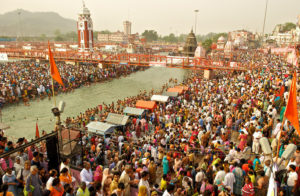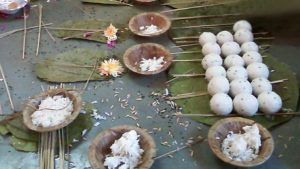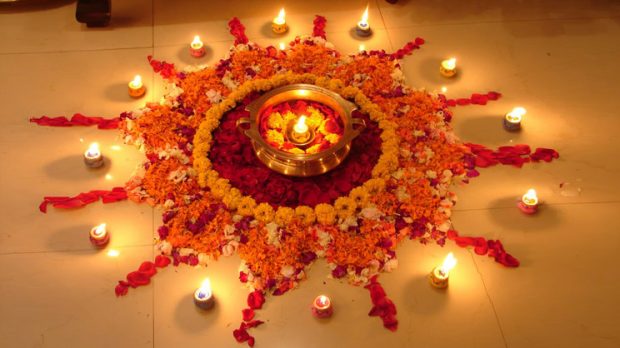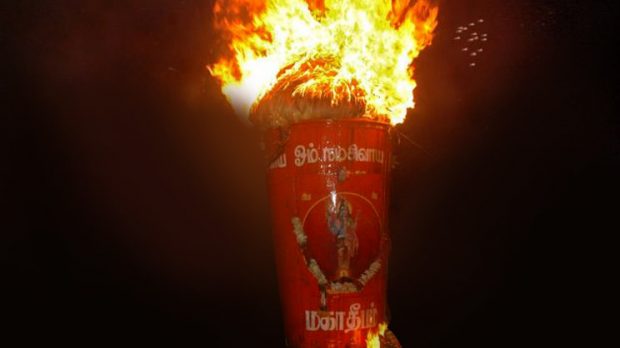The Philosophy behind Karthigai Deepam
We light a lot of lamps during the festival of Karthigai Deepam. Our sastras have enjoined upon us to recite a sloka:
Geetaa pathankaa Masakaacha Vrukshaa
Jale Sthalaye Nivasanthi Jeeva|
Dhrushtvaa Pradeebam na sa Janma Bhaajaa
Bhavanthi Nithyam Swabasaa Hi Vipraa||
This sloka is a prayer to Bhagawan to grant the boon of eternal bliss on all those beings which see this light. The being may be a worm or a bird or an ordinary mosquito or any living being in this universe or even a tree which we do not generally consider to be having a life of its own or a human being of any caste or creed. The sloka not only refers to those beings which live on the land or in the water. Since in its initial lines, the sloka has made a reference to birds and mosquitoes, it must be understood that the sloka has included the creatures that fly. Though it flies in the sky, a mosquito lays eggs in the water. A bird builds it nest among the branches of a tree and brings up its little ones. Fish lives only in the water; whereas a frog is an amphibian- it can live on the land and in the water. Many animals can live only on the land. In this manner, this sloka categorizes the living beings and prays for the absolution of their sins and eventual salvation.
Though the sloka refers to those beings which see the light of Karthigai Deepam, can a tree see like we do? Though the modern scientists declare that plants have feelings, we do not know whether they have the faculty of vision. It seems to be more appropriate to interpret it in the following way: “the being may be unable to see the light as in the case of a tree or does not see the light even if it has the capability; but let all those living beings on whom the brightness of this light falls be freed from the shackles of sin, the cycle of birth and death and be bestowed with eternal blessing.”
As how the light of a lamp falls on all living beings without any distinction, similarly the love from our heart should embrace everybody by its very brightness. With this light glowing in our heart, we should light the Karthigai Deepam as an external manifestation of this inner light.
In olden days, Chokkappaanai used to be lit in front of the temples with the help of a lamp brought from the temple. In the holy town of Thiruvannamalai , a huge lamp is lit during the Karthigai Deepam on top of the holy hill. There is significance behind all these acts of devotion. A small lamp cannot throw its light far and wide. The brightness of a Chokkappaanai can be seen for a long distance. When a lamp is lit on the top of a hill, as in Thiruvannamalai, it can be seen even from far off places, When the brightness falls upon all the beings within this huge boundary, their sins are washed away.. This noble thought was the inspiration behind Chokkappaanai and Thiruvannamalai Deepam.
Generally, two legged and four legged creatures are more in number. A bee has six legs, a spider eight, and many creatures have countless legs. Vedas, our holy scriptures not only frequently refer to the two legged and four legged creatures as Dwipaadh and Chathushpaadh and pray for their well being but also pray for the welfare of creatures with numerous legs and like snakes and fish which have no legs at all. There are mantraas or holy chants to this effect.
Srimadh Bhagawad Gita states that the enlightened one never makes a distinction among living beings. We should also ensure that the love from our heart flows across to everyone without making any differences though we may follow some distinctions in the work we do. Randhi Devan taught us this lesson when he gave charity without bothering about the caste or creed. This Karthigai Deepam sloka also includes people of all castes and creeds. When we pray for the welfare of people, we should not worry about his caste or even his conduct- he may be good or bad. Our sastras instructs us to love and help even those who suffer in hell because of the unforgivable sins they have committed.
Reproduced from the book – Deiva Thirukural.
Reach us to be a part of our whatsapp spiritual reminder group









